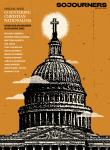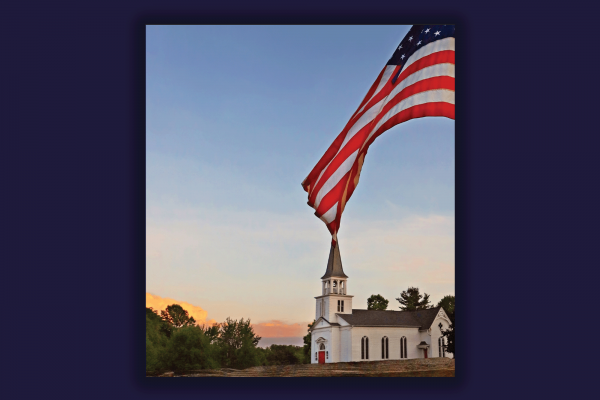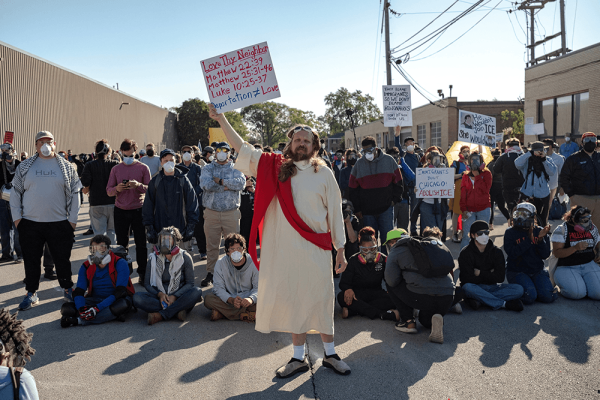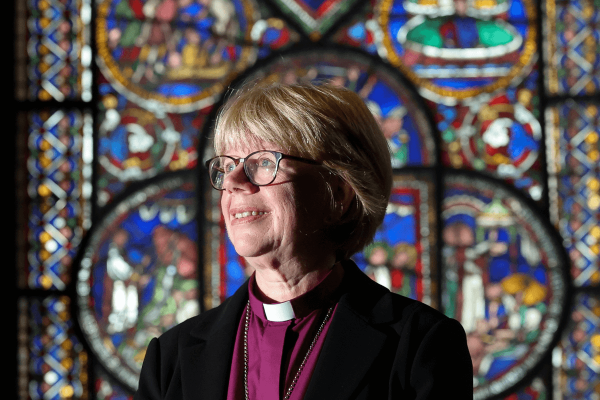IF WE ARE to end Christian nationalism, we must first develop a better idea of the threat we are facing.
Christian nationalism in the United States is a political ideology and cultural framework that seeks to fuse American and Christian identities. It suggests that “real” Americans are Christians, and that “true” Christians hold a particular set of political beliefs. It seeks to create a society in which only this narrow subset of Americans is privileged by law and in societal practice.
Christian nationalism is a gross distortion of the Christian faith that I and so many others hold dear. It employs the language, symbols, and imagery of Christianity, and it might even appear to the casual observer to be authentic Christianity.
But Christian nationalism merely uses the veneer of Christianity to advance its own aims. It points not to Jesus of Nazareth but to the nation, as conceived of by a dangerous political ideology, as the object of allegiance. When Christian symbols and language are used to appeal to order and conformity, point the intended audience to the American flag, or compel political unity under a particular leader, we have moved into the territory of Christian nationalism.
Christian nationalism is the greatest threat to religious liberty in the U.S. today, as well as a clear and present danger to our constitutional republic. It also poses an ongoing threat to the health and vitality of authentic Christian faith and practice in America.
Christian nationalism has ebbed and flowed throughout U.S. history. It has flourished when it was both a prevalent ideology and its adherents held political power that they used in law and policy. The same is true today: Christian nationalism is flourishing because it is a pervasive ideology and a well-funded political movement. Though it can be tempting to focus on the movement aspect of Christian nationalism, our efforts are better directed at dismantling the ideology.
Christian nationalism as an ideology exerts its influence along a spectrum. I’d argue that we have all been shaped by it to some degree. In their 2020 book, Taking America Back for God: Christian Nationalism in the United States, sociologists Samuel L. Perry and Andrew L. Whitehead describe four different orientations toward Christian nationalism based on their research. They classify people who fully embrace and advocate for Christian nationalist ideology as ambassadors; this is the smallest group, comprising less than 20 percent of the U.S. population. At the opposite end of the spectrum from ambassadors are rejecters — people who, like me and maybe you, actively reject Christian nationalist ideology. We make up about 22 percent of the American populace. Most Americans fall somewhere in the middle. Perry and Whitehead call the folks in this central band either “accommodators” of Christian nationalism (about 32 percent of Americans) or “resisters” (about 27 percent).
However, in doing the hard work of dismantling ideologies, labeling people definitively as “Christian nationalist” is both counterproductive and inaccurate. We are better served by thinking of these as systemic problems that we can learn to recognize and disengage from as we work with our communities to reject them.
In the 2023 PRRI/Brookings Institution study, the researchers identified five correlates of Christian nationalism: anti-Black racism, anti-immigrant views, antisemitic views, anti-Muslim views, and patriarchal understandings of gender roles. The more that a survey respondent embraced Christian nationalist views, the more likely they were to hold these other views. But a key finding showed that race, ethnicity, and religion made a difference as well. If someone was white and an “adherent” to Christian nationalism, in the terms of that study, they were more likely to hold anti-Black racist positions than someone who was Black and an adherent to Christian nationalism.
Recent research also shows that Americans who hold strongly to myths about the United States’ supposed “Christian heritage” tend “to draw rigid boundaries around ethnic and national group membership.” Such boundaries tend to exclude Muslims as a group and to be less supportive of interracial family relationships. White people who embrace Christian nationalism use ethnic boundaries, prejudice, and perceived threats to justify harsher treatment — including the use of excessive force — against racial minorities.
When people know more about Christian nationalism, they are much more likely to reject it than to embrace it. Clarity around what Christian nationalism is and the impact that it has on our and our neighbors’ freedoms is an important first step to dismantling the ideology and its threat to democracy.
Our democracy is made stronger by the participation of houses of worship in our public life. And our houses of worship are freer when candidates and parties don’t use them for partisan political purposes. Working to end Christian nationalism does not mean working to end Christian expression in the public square. The antidote to this scourge is not for Christians to simply shut up about our faith. But authentic, effective work to end Christian nationalism means discerning carefully and thoughtfully how we represent our faith and its claims in ways that don’t require that our faith receive special or preferential treatment.
Many people are compelled by their faith to advocate for their neighbors on any number of public policy matters. The question is not whether our faith can compel us to work appropriately in the public square; it can. The question is how to ensure our witness both represents our own faith and respects the faiths of others. As Christians engaging in the public square, we must remember to ground our advocacy in the teachings of Jesus and specifically his teaching to remember that we owe different allegiances to God and to Caesar (see Matthew 22:15–22). Our allegiance to God is always higher and deeper than our loyalty to earthly powers, so our public advocacy should not run afoul of our religious values and obligations.
As Christians against Christian nationalism, we have a firm word in Paul’s letter to the Galatians (5:13–14): “You were called to freedom, kindred; only don’t let this freedom be an opportunity to indulge your selfish impulses but serve each other through love. All the law has been fulfilled in a single statement: Love your neighbor as yourself.”
In every era when this ideology recurs, followers of Jesus must make a choice. In words of Rev. Jay Augustine, senior pastor of St. Joseph AME Church in Durham, N.C.: “Which Jesus do you serve? Which Jesus do you believe in?”

Got something to say about what you're reading? We value your feedback!






